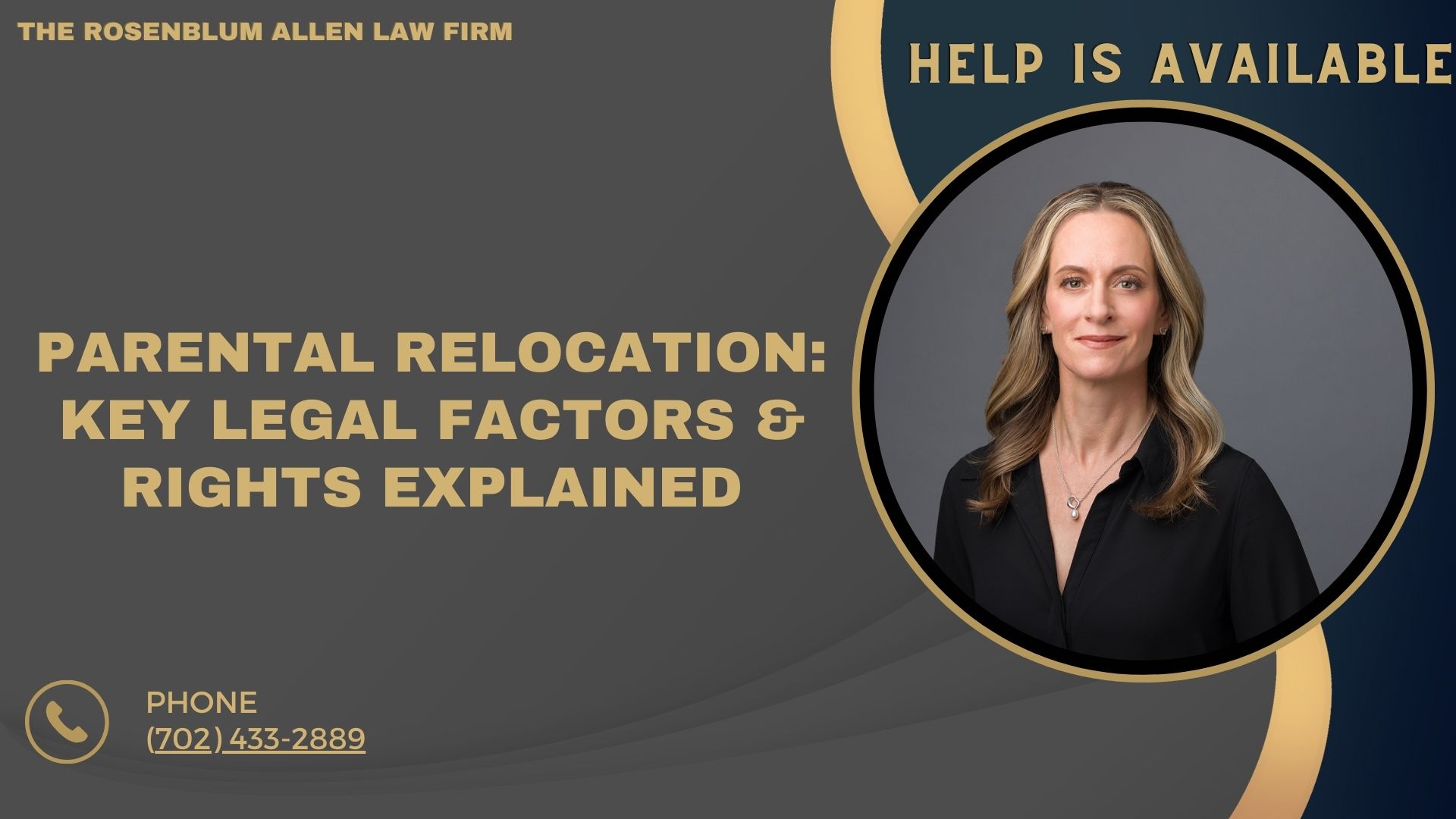Parental relocation refers to a custodial parent’s decision to move significantly away from the other parent, potentially affecting child custody and visitation arrangements. The relocation may be within the same state or to another state, and it typically requires legal approval if it impacts the existing custody order.
Why Parental Relocation is a Critical Legal Issue
Parental relocation is a complex legal matter because it directly affects:
- The child’s relationship with both parents
- The existing custody and visitation agreements
- The best interests of the child
- The rights of the non-relocating parent
Since family law prioritizes the child’s welfare, courts carefully evaluate relocation cases to ensure that any move aligns with the child’s best interests.
Overview of Key Legal Considerations
- State Laws on Relocation – Each state has specific laws regarding parental relocation, including notification and court approval requirements.
- Burden of Proof – The relocating parent must demonstrate that the move benefits the child.
- Impact on Custody Agreements – Courts may modify custody and visitation arrangements to accommodate the relocation.
- Rights of the Non-Relocating Parent – The non-moving parent has the right to contest the relocation in court.
Understanding Parental Relocation
What Constitutes Parental Relocation?
Parental relocation is not just any move; it typically involves a significant change in residence that affects custody or visitation. The legal definition of relocation varies by state, but common factors include:
- Distance of the move (e.g., moving to another city, state, or country)
- Impact on the child’s school, social life, and routine
- Whether the move disrupts the non-custodial parent’s ability to maintain their relationship with the child
Common Reasons for Parental Relocation
Parents may seek relocation for various reasons, such as:
| Reason | Explanation |
|---|---|
| Job Opportunity | A parent may need to move for career advancement or a new job. |
| Family Support Network | Relocation may provide access to extended family who can help with childcare. |
| Better Educational Options | The move may place the child in a better school district or offer special educational programs. |
| Financial Stability | Lower cost of living or better economic opportunities may benefit the child. |
| Health or Safety Concerns | The move might provide a safer living environment or access to better healthcare. |
Impact on Custody and Visitation Rights
Relocation can significantly impact an existing custody agreement. Some potential effects include:
- Change in Primary Custody – If the custodial parent moves, the court may reconsider which parent should have primary custody.
- Modification of Visitation Schedules – The non-relocating parent may receive extended holiday or summer visitation instead of frequent visits.
- Increased Travel Costs – The court may require adjustments to travel expenses for visitations.
- Emotional Impact on the Child – Relocation may cause stress and adjustment difficulties.

Legal Framework for Parental Relocation
Overview of Family Law and Relocation Statutes
Parental relocation cases fall under family law, which varies from state to state. While some states have strict rules requiring court approval before a parent moves, others allow more flexibility.
Most states require the relocating parent to:
- Provide written notice to the other parent
- Allow time for the other parent to object
- Prove in court that the move is in the child’s best interests
Courts consider relocation a significant change to custody arrangements. Because of this, they carefully evaluate each case to ensure the child’s well-being comes first.
Differences in State Laws Regarding Parental Relocation
The rules for relocation aren’t the same everywhere. Some states have specific mileage limits before court approval is needed. Others consider any move that disrupts visitation a legal issue.
| State Law Factor | Examples |
|---|---|
| Distance Threshold | Some states require court approval if moving 50+ miles away. |
| Notification Requirement | A relocating parent may need to give 30-90 days’ notice to the other parent. |
| Court Approval | Some states require approval before relocating; others allow it unless objected to. |
| Burden of Proof | In some states, the relocating parent must prove the move benefits the child. |
Since laws vary, it’s always best to consult a local family law attorney to understand your state’s rules.
How Courts Determine Relocation Cases
Courts look at what’s best for the child above all else. Judges weigh several factors before approving or denying a move.
A few key questions a judge may ask:
- Why is the parent moving? Is it for a better job, family support, or to move away from the other parent?
- How will the move affect the child? Will they be in a better school? Closer to extended family? Or will they lose essential relationships?
- How will it affect the other parent? Can they still have regular contact? Will their bond with the child suffer?
- Is there a plan in place? The relocating parent should have an evident schooling, healthcare, and visitation plan.
The parent requesting the move must prove it will improve the child’s life. If the court isn’t convinced, the request may be denied.
Factors Courts Consider in Parental Relocation Cases
Best Interests of the Child Standard
The child’s well-being is always the top priority in a relocation case. Courts consider how the move will impact the child’s:
- Emotional health – Will they feel secure and supported in a new environment?
- Education – Will they have better schooling opportunities?
- Family relationships – Will they be closer to a family who can provide care and stability?
How Courts Define the Child’s Best Interests
Judges look at factors such as:
- The child’s age and maturity – Older children may have more say in the decision.
- Existing relationships – Strong ties to the other parent, siblings, and community matter.
- The stability of the new environment – A stable home is critical for a child’s growth.
Psychological and Emotional Impact of Relocation on Children
Relocation can be stressful for kids. They may have to:
- Leave behind friends, schools, and activities they love.
- Adjust to a new home, new school, and new routines.
- Spend less time with the non-relocating parent, which can be emotionally challenging.
Because of these concerns, courts examine how well the relocating parent can support their child’s emotional well-being.
Impact on the Non-Relocating Parent
Relocation doesn’t just affect the child—it also changes the non-moving parent’s role.
Changes to Visitation Schedules
If the child moves far away, weekend visits may not be possible. Courts may adjust visitation by:
- Granting more extended holiday and summer visits to make up for lost time.
- Increasing virtual visitation through video calls and messaging.
- Splitting travel costs between both parents.
Maintaining Parent-Child Relationships from a Distance
Long-distance parenting can be challenging. Courts expect parents to:
- Encourage communication with the other parent.
- Be flexible with visitation arrangements.
- Use technology (FaceTime, Zoom, texting) to keep the bond strong.
A parent who moves without considering these factors may hurt their case in court.
Reason for the Move
The reason behind the relocation plays a major role in whether a judge approves it.
| Acceptable Reasons | Unacceptable Reasons |
|---|---|
| Better job opportunity | To limit the other parent’s access |
| Closer to family for support | Out of spite or revenge |
| Better schools for the child | No real plan or stability |
| Safer living environment | Just for personal preference |
If the move benefits only the parent and not the child, the court may reject the request.
Ability to Maintain the Child’s Stability
Courts want to minimize disruption in a child’s life. They look at:
School and Community Continuity
- Will the child be forced to switch schools?
- Will they have access to similar extracurricular activities?
- Will they be able to keep friendships and social connections?
Social and Extracurricular Activities
A child’s daily routine matters. Judges consider whether the move allows them to continue:
- Sports and hobbies they love.
- Religious or cultural activities that are important to them.
- Social connections that provide emotional support.
Courts may deny the relocation if the move disrupts stability without a clear benefit.

Legal Process for Parental Relocation
How to File for Relocation Approval
If you’re a parent considering relocation, you can’t just pack up and leave—at least not without following the proper legal steps. The process varies by state, but most courts require you to:
- Notify the other parent in writing
- File a petition with the family court
- Provide reasons for the move
- Present a relocation plan to the court
- Attend a hearing, if necessary
Skipping any of these steps could hurt your chances of getting approval—or worse, put you in legal trouble for violating a custody order.
Notifying the Non-Relocating Parent
Most states require formal written notice before a parent moves with the child.
Required Legal Notice Periods
Every state has different rules, but common deadlines for notifying the other parent include:
| State Requirement | Notice Period |
|---|---|
| Strict states (e.g., Nevada, Florida) | 60–90 days before the move |
| Moderate states (e.g., California, Texas) | 30–60 days before the move |
| Lenient states (e.g., some rural states) | 30 days or less |
If the moving parent fails to give notice, the court may block the relocation—or even change custody to the other parent.
Contents of a Proper Relocation Notice
A formal notice should include:
- The new address and contact information
- The date of the intended move
- The reason for relocating
- A proposed visitation plan for the non-moving parent
This gives the other parent a chance to object before significant changes happen.
Court Hearings and Legal Proceedings
The process may be simple if the other parent agrees to the move. But if they object, a court hearing is usually required.
Presenting Evidence to Support the Relocation Request
At the hearing, the relocating parent must convince the judge that the move benefits the child. Useful evidence includes:
- Job offer letters showing career advancement
- School rankings comparing the current and new schools
- Medical records proving better healthcare access
- Statements from family members confirming support in the new location
Role of Family Law Attorneys in Relocation Cases
Relocation cases can get complicated fast. An experienced family law attorney helps by:
- Filing legal paperwork correctly
- Gathering evidence to support the move
- Arguing the case in court if the other parent objects
Without legal guidance, a parent may struggle to meet court requirements, resulting in a denied request.
Opposing a Parental Relocation Request
Legal Rights of the Non-Relocating Parent
If one parent wants to move, the other doesn’t have to accept it. They have the right to:
- File an objection with the court
- Argue against the move in a hearing
- Request a change in custody if the move harms the child
Courts won’t automatically side with the moving parent. If the relocation isn’t in the child’s best interest, the court may block it altogether.
Common Reasons Courts Deny Relocation Requests
Not every relocation request gets approved. Judges may say no if:
| Reason for Denial | Explanation |
|---|---|
| Bad faith move | The parent is moving just to keep the child away from the other parent. |
| Negative impact on the child | The move would cause emotional, educational, or social harm. |
| Weak justification | The relocating parent can’t prove the move benefits the child. |
| Disrupts the other parent’s relationship | The move would severely limit visitation or parental bonding. |
If the court finds that the move is more about the parent’s wishes than the child’s needs, the request may be denied.
Steps to Challenge a Relocation Petition
If you’re the non-moving parent and want to challenge the move, here’s what you should do:
Filing an Objection in Court
Once you receive the relocation notice, you typically have 30 days to respond. You must:
- File a formal objection in family court
- State why you believe the move is harmful
- Request a court hearing
If you don’t respond within the deadline, the court may assume you agree to the move.
Providing Evidence Against Relocation
You must show that the move will hurt your child to strengthen your case. Helpful evidence includes:
- Testimony from teachers or counselors about the child’s emotional well-being
- School records show the child is thriving in their current environment
- Proof of strong parent-child bonding, such as frequent visits and activities
- Alternative solutions, like job options for the moving parent in the current location
The more compelling your case, the higher the chances of blocking the relocation.
Modifying Custody and Visitation After Relocation
Adjusting Parenting Plans Post-Relocation
If the court approves the move, custody and visitation schedules must often be modified. This ensures both parents still have meaningful time with the child.
Some common changes include:
- Fewer but longer visits (e.g., extended summer or holiday stays)
- More virtual visitation (FaceTime, Zoom, texting)
- Changes in travel expenses (one parent may have to cover travel costs)
Virtual Visitation and Alternative Custody Arrangements
When physical visits become harder, courts often push for virtual visitation. This can include:
- Daily video calls to keep the bond strong
- Online school check-ins so the non-custodial parent stays involved
- Shared calendars to schedule virtual visits
Legal Procedures for Modifying Court Orders
If a relocation significantly disrupts the custody agreement, either parent can:
- File a motion to modify custody
- Request a new parenting plan
- Ask the court to review travel and financial responsibilities
A well-structured modification ensures that both parents remain involved in their child’s life, even from a distance.
How to Strengthen a Parental Relocation Case
Building a Strong Argument for Relocation
If you’re the parent seeking to relocate, you need a clear, compelling case to convince the court that the move benefits your child. Judges don’t approve relocations lightly. They will ask, “How does this move improve the child’s life?”
To strengthen your case, focus on:
- The child’s well-being – How will their education, health, and emotional stability improve?
- Better opportunities – Does the move offer better schools, healthcare, or financial security?
- A solid plan – Where will the child live? How will visitation work? Who will cover the travel costs?
A judge is more likely to approve the move if they see clear, well-documented benefits for the child.
Gathering Supporting Evidence
The right evidence can make or break a relocation case. Courts rely on facts, not just opinions.
Types of Evidence That Help Relocation Cases
| Type of Evidence | How It Helps |
|---|---|
| Job offer letter | Proves career stability and increased income |
| School comparison | Shows that the new school is academically stronger |
| Healthcare access | Demonstrates better medical care for the child |
| Family support letters | Confirms the presence of a strong support system |
| Counselor testimony | Highlights emotional benefits for the child |
Demonstrating Commitment to Co-Parenting
Judges want to see that both parents will stay involved, even if they are miles apart. A relocating parent should show:
- Willingness to adjust visitation schedules
- Plans for virtual visitation (FaceTime, Zoom, phone calls)
- Readiness to share travel expenses
A parent who shows cooperation rather than conflict has a stronger case in court.

How to Defend Against a Weak Parental Relocation Case
Identifying Weaknesses in the Relocation Request
If you’re a non-relocating parent and want to fight the move, look for gaps in the other parent’s argument. Judges are less likely to approve relocation if:
- The move is not necessary for the child’s well-being.
- The new environment offers no clear advantages over the current one.
- The moving parent has no stable job or housing in the new location.
- The relocation will damage the child’s relationship with the other parent.
Gathering Counter-Evidence
Just like the relocating parent must prove the move is beneficial, the opposing parent must prove why staying is better.
Best Types of Evidence to Block Relocation
| Type of Evidence | How It Strengthens Your Case |
|---|---|
| School performance reports | Shows the child is thriving academically where they are |
| Psychological evaluations | Demonstrates that moving could harm emotional well-being |
| Parenting time records | Proves the other parent is actively involved in the child’s life |
| Community and social ties | Highlights friendships, sports, and activities that would be lost |
Presenting a Strong Case in Court
To successfully challenge relocation, you must:
- File an official objection in court before the deadline.
- Show evidence that relocation harms the child’s best interests.
- Offer an alternative solution (such as shared custody or a local job search for the other parent).
A well-prepared argument backed by facts gives you the best chance of keeping your child close.

Breaking It All Down
Parental relocation is a complex legal issue that can change custody arrangements and affect parent-child relationships. Courts carefully weigh the decision, prioritizing the child’s best interests.
Key takeaways:
- Relocating parents must prove the move benefits the child.
- Non-relocating parents can challenge a move by showing potential harm.
- Strong evidence matters in both supporting and opposing relocation cases.
- Judges want a cooperative co-parenting plan, not just a one-sided argument.Every parental relocation case is unique. Understanding the legal process is crucial whether you want to move or fight to keep your child nearby.
If you’re facing a relocation dispute, consider seeking legal guidance to protect your rights and your child’s well-being. A family law attorney can help you present the strongest case possible and ensure the best outcome for your child.

Frequently Asked Questions
Can a parent move with a child without notifying the other parent?
No. In most states, a parent cannot relocate with a child without providing formal notice to the other parent and, in many cases, obtaining court approval. Moving without following legal procedures could result in legal consequences, including a custody modification in favor of the non-moving parent.
What happens if a parent relocates without court approval?
If a parent moves without permission, the non-relocating parent can file a motion for contempt in court. This may result in:
- The relocating parent is being ordered to return the child.
- A custody modification in favor of the non-relocating parent.
Possible legal penalties, such as fines or even loss of custody.
Can a child's preference influence a relocation decision?
Yes, but it depends on the child’s age and maturity. Many courts consider children’s preferences, especially if they are teenagers, but the final decision is always based on the child’s best interests rather than solely their wishes.
Does the relocating parent always have to pay for travel expenses?
Not always. Courts may divide travel costs between both parents, or the relocating parent may be required to cover most (or all) of the expenses, especially if they initiated the move. The court considers factors such as:
- Each parent’s financial situation
- The reason for the relocation
The impact of travel costs on visitation rights
Can a relocation order be reversed after it has been granted?
Yes, but reversing a relocation order is difficult. The non-relocating parent must prove that the move has caused significant harm to the child or that circumstances have changed in a way that justifies modifying the order. This typically requires filing a petition to modify custody and presenting substantial evidence to support the request.
Is parental relocation handled differently for unmarried parents?
It depends on whether the unmarried father has legal custody rights. If a father has not established paternity or legal custody, the mother may have more freedom to relocate. However, if both parents share legal custody, the same relocation rules apply as they would in a divorce case.
How long does a relocation case take to resolve?
The timeline varies depending on whether both parents agree or disagree on the move. The relocation may be approved within a few weeks or months if it is uncontested. If the case goes to court, it could take several months to a year to reach a decision, especially if a trial is necessary.
Can a relocation request be approved temporarily?
Yes. In some cases, courts may grant a temporary relocation while a final decision is pending. This often happens if:
- The move is urgent (e.g., for a job transfer or medical emergency).
- The court believes the move will likely be approved in the final ruling.
However, a temporary order does not guarantee permanent approval, and the non-moving parent can still contest it.
Does relocating parents automatically get primary custody?
No. Courts do not assume that a moving parent should automatically become the primary custodian. Suppose relocation severely impacts the other parent’s ability to have meaningful contact with the child. In that case, the court may reconsider custody arrangements and even award primary custody to the non-relocating parent instead.
What if the relocating parent has sole custody?
Even if a parent has sole custody, they may still need to follow legal relocation procedures, primarily if the move affects the other parent’s visitation rights. Courts may still intervene if the move is deemed harmful to the child or unfairly limits the other parent’s ability to maintain a relationship with the child.
IHow can co-parents make long-distance custody work?
Successful long-distance co-parenting often requires:
- Consistent virtual communication (video calls, messages, shared calendars).
- Flexible visitation schedules, such as more extended holidays or summer stays.
- Clear agreements on travel arrangements and expenses.
Parents prioritizing cooperation and stability for their children tend to succeed more in long-distance custody situations.
Can relocation affect child support payments?
Yes. A significant relocation can lead to a modification of child support, especially if:
- Travel expenses increase due to the move.
- The relocating parent experiences a substantial financial change (such as a new job or higher cost of living).
The custody arrangement shifts significantly, impacting financial responsibilities.
Should I hire an attorney for a parental relocation case?
While it’s possible to represent yourself, relocation cases are complex and involve strict legal procedures. An experienced family law attorney can:
- Help file the correct paperwork.
- Gather and present strong evidence.
- Advocate for your rights in court.
Legal guidance increases the chances of a favorable outcome, whether you are seeking to relocate or opposing a move.

Additional Resources for You from The Rosenblum Allen Law Firm.
For those seeking additional legal assistance, we offer a range of services to support various legal needs. Here are some helpful resources:
- Criminal Defense Attorney – Protect your rights with the help of a skilled criminal defense attorney in Las Vegas.
- Las Vegas DUI Lawyer – Facing a DUI charge? Our experienced lawyers can help navigate your defense.
- Domestic Violence Lawyer Las Vegas – If you’re dealing with domestic violence accusations, get the legal representation you need.
- Drug Possession Lawyer – A dedicated attorney can help you fight charges related to drug possession.
- Sex Crimes Attorney – Protect your future by hiring an experienced sex crimes attorney in Las Vegas.
- CPS Defense Attorney – If you’re facing CPS investigations, a lawyer can help safeguard your rights.
- Misdemeanor Lawyer – Defend against misdemeanor charges with proficient legal representation.
- Las Vegas Warrant Defense Attorney – If you have an active warrant, get professional legal help to address it.
- Las Vegas Probation Violation Attorney – Violation of probation? Speak with a skilled attorney to manage your case.
- Theft Crime Defense Lawyer – Charged with theft? We offer proficient legal defense to help fight these charges.
- Kidnapping Lawyers – Facing serious charges like kidnapping? Get a dedicated lawyer to protect your rights.
- Juvenile Defense Lawyers – If your child is facing charges, a juvenile defense lawyer can provide guidance and support.
- Firearms Lawyer Las Vegas – If you’re dealing with firearms charges, we can help you defend your case.
Feel free to visit these links for more information and legal assistance tailored to your needs.

Offsite Resources for You
Here are some offsite resources that could be useful for readers looking for more information on parental relocation and related family law topics:
- American Bar Association – Offers a wealth of resources and articles about family law, including parental relocation and custody issues.
- FindLaw – A comprehensive legal resource that covers family law topics, including parental relocation and custody modification.
- Nolo – Provides practical legal advice and tools for individuals dealing with family law cases, including guides on relocation and custody.
- Family Law Help – A resource dedicated to family law matters, offering information and self-help tools for parents involved in relocation cases.
- Child Custody & Support – Focuses on child custody issues, including relocation, with helpful articles and resources for parents navigating custody disputes.
- The National Parents Organization – Advocates for shared parenting and provides information on custody matters, including parental relocation.
- LawHelp.org – A helpful site for finding legal assistance and information on family law matters, including relocation and custody modifications.
These resources offer further guidance and support for individuals navigating parental relocation or related family law issues.

A Special Message from Our Lead Attorney, Molly Rosenblum Allen, Esq

Thank you for taking the time to explore these valuable resources. I hope you found the information helpful as you navigate your situation. If you’re ready to take the next step, my team and I at The Rosenblum Allen Law Firm are here to assist you. Feel free to call us at (702) 433-2889 to get the ball rolling.
We look forward to working with you.
Best regards,
Molly
The Rosenblum Allen Law Firm







